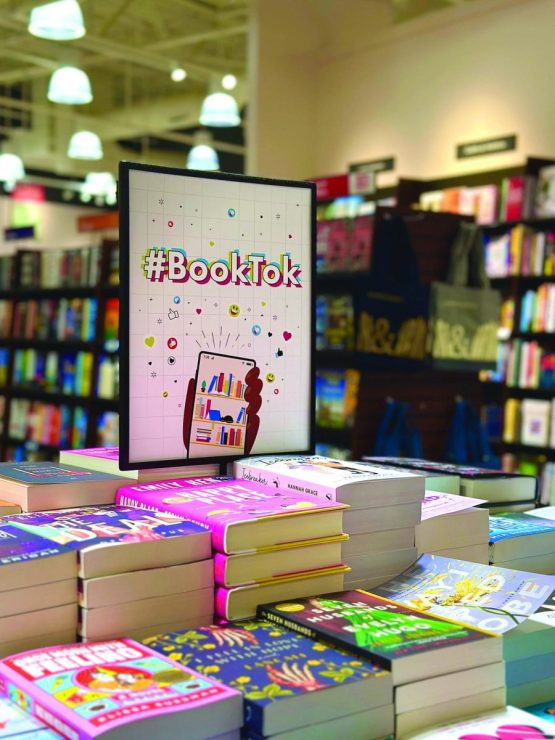The online book community consistently overhypes the same mediocre books

Photo by Allanah Kemmis via bhsnews.org.
I have been following the TikTok book community (known as “BookTok”) for years now. The community especially started to pick up during the pandemic, and thanks to that time in quarantine, many folks were able to rediscover or simply discover their love of reading.
At that time, BookTok was a safe little bubble on the internet where folks were sharing their favorite books, fanart, and connecting with others who had similar tastes. I received many great recommendations and loved hearing what people thought about my longtime favorite books.
Sadly, all good things must come to an end. What was once a space for like-minded people to connect and converse has become overrun by trends and cheap marketing tactics. This trend-ification of books is what concerns me the most.
The experience of reading a well-crafted novel with an original storyline, even with some familiar tropes sprinkled in here and there, is unmatched. However, thanks largely to BookTok, this is something I have been experiencing less and less. Now more than ever, I see misspelled words and trivial errors in books that just make them feel like a waste of time to read — if I even manage to get through them. While reading BookTok darling These Violent Delights, I spotted grammatical errors everywhere, and the lack of thorough editing was glaring. I have been seeing sloppy mistakes like this more often as books are being rushed out to keep up with trends.
A majority of the recommendations I see on BookTok nowadays are the same ones that have been recommended for years. And when there are new titles out they are the same stories and characters I have already read to death. As I see it, this is largely due to the over-reliance on tropes that is becoming increasingly popular. Some of the more highly recommended are “grumpy x sunshine”, where one partner is overly pessimistic and the other is bubbly and upbeat, and “enemies to lovers”, which is self explanatory. Both of these tropes have hundreds of thousands of videos under their tags on TikTok.
Authors are feeling the pressure to promote their books on TikTok as they see the influence the BookTok community can have. Take Colleen Hoover and her nearly five billion views on TikTok for example. As I see it, Hoover’s popularity is, in large part, due to her viral videos on TikTok. To try and replicate this, many authors turn to TikTok for similar attention and use easy promotional tactics, like tropes, in hopes of getting as many views as possible. This trend-ification of books is what concerns me the most. While it’s understandable, this marketing has started changing readers’ attitudes towards the books they choose to read.
Rather than seeking out innovative stories, many folks stick to reading the same types of books time and again.
I often hear buzz around new books and when I ask what it’s about, I’m met simply with “it’s an enemies-to-lovers!” as if that alone is a whole story. This way of conflating plots with tropes creates stories that fall flat and lack originality. What people don’t seem to understand is that tropes are tools to support a larger and more fleshed out narrative.
One book that I feel encapsulates this idea of “all trope no plot” is Elena Armas’ The Spanish Love Deception. This book was promoted as an enemies-to-lovers and fake-dating fun romance novel. It delivered on the use of those tropes, but not much else. I found the plot and characters to be exceedingly shallow. I was wary of reading it in the first place because it was outside of my usual genre, but the praise it was receiving online convinced me to give it a go. I can confidently say that this was the book that had me lose my faith in BookTok recommendations.
These over-hyped and low quality books are a dime a dozen on TikTok and I, personally, am sick to death of reading the same stories with the same characters. I cannot even say how many times I’ve read a book where the female main character is only a few steps away from a manic pixie dream girl and her love interest is only ever described as “tall, dark, and handsome.” But, these are also the books that go viral and seem to keep BookTok audiences entertained. After all, a hate read is still a read, right? The question that remains is whether or not this commercialisation is really worth it when it comes at the expense of quality and the craft of the books themselves.
While BookTok may be falling from grace, not all hope is lost for readers seeking an online community. The bookworms of Instagram (“Bookstagram”) seem to remain somewhat separated from the intense trend cycle that TikTok is promoting. For anyone who misses the closeness and thoughtful recommendations from the original days of BookTok should try exploring Bookstagram for original recommendations and engaging influencers.






